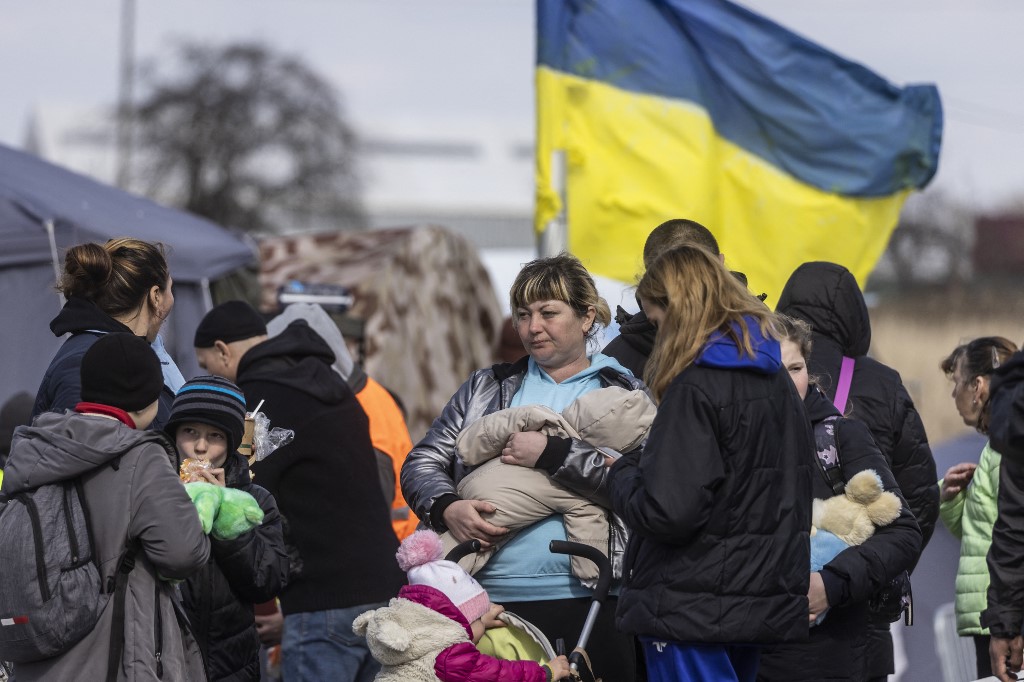Priti Patel plans to turn the UK into asylum hell. The Lords are trying to stop her

An epic last stand is underway in the UK’s second chamber, as the Lords seek to overturn the government's Nationality and Borders Bill, which effectively criminalises all asylum seekers.
Home Secretary Priti Patel’s bill rips up the basic tenets of the 1951 Refugee Convention, which requires signatory countries to offer asylum to those fleeing war or persecution. A Tory MP, Bill Wiggin, summed up the government and its supporters' view of who should be let into Britain: "We want Ukrainians, we want Qataris, we don’t want people in rubber boats."
The new scheme 'is already creating a class system among refugees, with Ukrainians jumping to the front of the queues that the rest of the world would never be considered for'
On Monday night, for the second time, the Lords rejected the most controversial clauses of the bill, which is designed to appeal to Patel's hard-right anti-immigrant base, fuelled by decades of racist media coverage about asylum seekers.
The House of Lords voted to require formal agreements with third states to prevent asylum claimants being forcibly returned to unsafe countries, as the new bill proposes; it overturned the government’s plan to deny unaccompanied child asylum seekers in Europe the right to join a family member legally in the UK. It also voted against provisions to retrospectively impose deprivation of citizenship orders, a draconian power included in the bill.
While this parliamentary fight goes on, refugee campaigners and humanitarian experts fear that the UK government is responding to the Ukrainian refugee crisis with a two-tiered system that excludes other refugees and leaves the charity sector and public carrying the burden.
Stay informed with MEE's newsletters
Sign up to get the latest alerts, insights and analysis, starting with Turkey Unpacked
Two-tier system
The Homes for Ukrainians scheme announced last month by Michael Gove, secretary of state for housing, with cash payments to refugee host families for six months, has been designed to ensure that the offer to Ukrainians is not extended to others, says refugee campaigner Ros Ereira.
The scheme is separate from the existing Home Office system for asylum seeker applicants, which is far more difficult to navigate and leaves thousands of asylum seekers waiting in limbo for months or years to find out whether they have a right to remain. And that is before the bill currently in parliament becomes law.
More than 100,000 people have signed up to the humanitarian scheme to allow Ukrainians to be hosted in the UK by individuals, with a payment of £350 a month from the government. Ukrainians will be able to remain in the UK for three years, with the right to work and access to welfare benefits.
The new scheme "is already creating a class system among refugees, with Ukrainians jumping to the front of the queues that the rest of the world would never be considered for," warns one expert who wished to remain anonymous.
It can’t be argued that this is because of Russian involvement, they say, “because they [the Russians] took out Aleppo and there was nothing tangible for Syrians then”.
Following the Syrian refugee crisis of 2015, when hundreds of thousands of people fled the violence in Syria by boat or overland to Turkey and the European Union, the UK pledged to take 20,000 refugees over five years, a fraction of the number taken in by Germany and other EU states.
A record 1.3 million migrants applied for asylum in the 28 member states of the EU, and Norway and Switzerland in 2015. That record was surpassed in the Ukraine war in only three weeks, with more than three million people fleeing the country.
Gove has pledged that the UK will take “unlimited numbers of Ukrainians”, an offer that was not extended last year to Afghans fleeing the takeover of their country by the Taliban and the departure of Nato forces, or to Syrians.
According to the UK Foreign Secretary Liz Truss, the UK evacuated 17,000 people from Afghanistan from 1 April to 1 September last year. Some 7,000 of those were eligible for the Afghan Relocations and Assistance Policy, launched on 1 April 2021 to resettle interpreters and other staff who worked for the UK in Afghanistan.
The vast majority of Afghan refugees remain in neighbouring countries Pakistan and Iran.
Bureaucratic hurdles
The campaigners Middle East Eye spoke to were at pains to say that what Ukrainians had been offered by the UK was still “crap” and inadequate compared with the response of the EU states, who waived the application process for Ukrainians. Poland has already taken in more than 2.3 million Ukrainians.
The government has faced criticism for refusing to lift the bureaucratic hurdles facing refugees applying for asylum in the UK, leaving thousands of Ukrainians who are fleeing the Russian invasion trying to access the complex application system from Europe.
'No Ukrainians have come here without going through a third country, but none of the press are banging on about this for Ukrainians'
- Ros Ereira, Refugee Action
However, the sources said even the system now being put in place for Ukraine was never offered to refugees fleeing war in the Middle East and Africa.
The new scheme comes as the government’s controversial Nationalities and Borders bill proposes to create a two-tiered system of asylum, in which those who arrive by “irregular” means are treated as criminals who can be deported to offshore detention facilities or face four years in prison. (A Home Office minister admitted this could also apply to Ukrainians who arrived via unofficial routes.)
The government claims the bill aims "to deter illegal entry into the UK, thereby breaking the business model of people smuggling networks and protecting the lives of those they endanger".
Ereira says of the bill's Clause 11, which will create two classes of refugees: “A two-tier system in the bill going through the Lords creates a different set of rights if [refugees] arrive through irregular means - but refugees arriving here have all come this way."
The vast majority of refugees have no means of arriving in the UK other than through irregular means, such as by small boats across the English Channel. "Then you can be offshored and processed somewhere else, basically deported, and it criminalises those people," says Ereira.
Under the new system, asylum seekers can’t pass through a third safe country to arrive in the UK, Ereira notes, “but if you can’t fly from a war zone, you can’t get here without getting through a third country. No Ukrainians have come here without going through a third country, but none of the press are banging on about this for Ukrainians."
Contrasting narratives
The way the UK media has treated the Ukrainians stands in contrast to the way Afghans, Syrians and others fleeing wars have been portrayed in the media over the past two decades. Some sympathy was extended to Afghans who had assisted British forces during the 20-year Nato intervention in the country, but the system in place to bring them to the UK was limited, leaving thousands behind in the chaotic UK-US withdrawal last summer. (Meanwhile, Prime Minister Boris Johnson personally intervened to bring out hundreds of dogs.)
"The press has been making it so easy to empathise with the Ukrainian situation and framing it in ways to make it very easy for people to want to help them, in ways that they haven’t done for a lot of other people," says Ereira.
Ereira had an inside view on what this meant for Afghans left behind, people with whom she had contact through her refugee work. “I was given access to that humanitarian-only emergency email address to the Home Office… People [in Afghanistan] were saying ‘I’m in a bus right now, I was beaten by the Taliban, there are bombs going off’. When I tried to contact the Home Office I was getting an automated response, saying in an awful lot of words ‘we are not going to read your email’, and later saying ‘we did a wonderful job, thank you for your interest in Afghanistan’.”
Meanwhile, she was "getting messages from Afghans, saying, ‘I am in a basement, the Taliban are coming, I am going to kill myself’. Those messages petered out, because bad things were happening, people were making their own way.”
This is the fate that Priti Patel appears to want for those fleeing war and terror under her vicious anti-asylum regime.
A spokesperson for the UK Refugee Council said the bill was still likely to go through. "The government is now seeking to criminalise those who have no choice but to make their own way to the UK without a visa," the spokesperson said. "It’s a cruel and heartless move that is dramatically turning our back on the commitment made over seven decades ago when the UK was one of the founding signatories of the Refugee Convention."
The views expressed in this article belong to the author and do not necessarily reflect the editorial policy of Middle East Eye.
Middle East Eye delivers independent and unrivalled coverage and analysis of the Middle East, North Africa and beyond. To learn more about republishing this content and the associated fees, please fill out this form. More about MEE can be found here.








